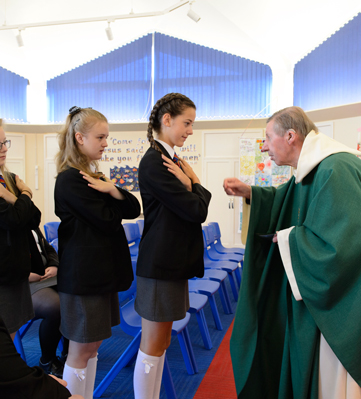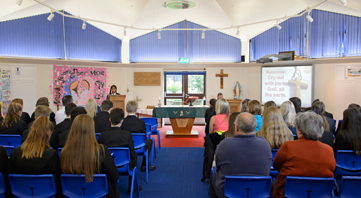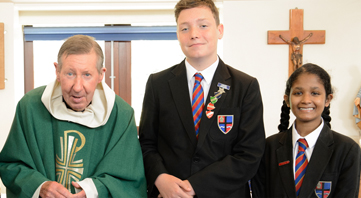Course Overview: RE
At Key Stage 3, we teach each group for two hours per week. We deliver a curriculum designed to fully meet the requirements of the Bishops Curriculum Directory and keep pupils engaged with religious teachings and practices, as well as raising questions of morality and personal development. Our schemes of work include the teachings of the Catholic Church and we endeavor to deepen every pupil’s knowledge and understanding of these teachings.



Year 7
Half Term 1
7.1 Community. This unit aims to help the pupils to develop a sense of belonging within this new school community. It will encourage them to consider the importance of the different communities to which they belong and the support which they receive from these groups. The pupils will focus upon Baptism as the first sacrament of initiation.
Half Term 2
7.2 Story and Bible. Pupils will develop their understanding of the scriptures. Pupils will use scripture referencing to locate important stories for example, the teachings of Jesus. Pupils will use Old Testament passages as they consider the teachings and history of the Jewish religion.
Half Term 3
7.3 World Poverty. Pupils can explain the meaning of poverty. Pupils can identify causes and consequences of poverty. Pupils can identify Biblical teachings on Poverty.
Half Term 4
7.4 Easter and Lent. Pupils will be able to describe the events of Easter Sunday. They will explain the significance of Jesus’ appearance on the road to Emmaus. Pupils will explain the significance of the Resurrection of Jesus.
Half Term 5
7.5 Creation and Pentecost. Pupils will describe what happens in the Genesis account of Creation. Pupils will evaluate the compatibility of scientific explanations of the world with Genesis. Pupils will explain the meaning of “imago Dei”.
Half Term 6
7.6 Hinduism. This is the first opportunity given to the pupils to study the beliefs and practice of those who belong to other major world religions. They will realise that Christianity is one of six major World Religions and learn that Hinduism is the oldest. Pupils will learn about Hindu beliefs, practices and Holy Scripture.
Year 8
Half Term 1
8.1 Islam. Pupils will know and understand the importance of Muhammad as the Holy Prophet (Peace be upon him). Pupils will know and understand that the five pillars are principles and foundations for the life of the community. Pupils will understand that the Qu’ran sets out the Islamic beliefs, teaching about Allah, life after death, and Allah’s messengers and angels.
Half Term 2
8.2 Jesus. Pupils will analyse evidence for the existence of Jesus. Pupils will explain the importance of the incarnation to Christians today. Pupils will explore the concepts of Jesus the Teacher and Saviour in the Bible.
Half Term 3
8.3 Forgiveness and Reconciliation. Pupils examine original sin and how sin can interfere with our relationship with God. Pupils understand the Church teachings on Salvation and Grace. Pupils know about the sacraments of reconciliation and anointing of the sick. Pupils understand the importance of these sacraments.
Half Term 4
8.4 The Eucharist. Pupils will know and understand the different parts of the Mass and their importance. Pupils will explore the events of the Last Supper and artwork of the Last supper. Pupils will examine the ‘real presence’ and denominational differences on the Eucharist.
Half Term 5
8.5 The Church. Pupils will examine the history of the Christian Church including the reformation and the early Ecumenical councils. Pupils will know and understand the leadership of the Catholic Church. Pupils will examine the four marks of the Church and the Church as the Body of Christ.
Half Term 6
8.6 Judaism. Pupils will gain a basic knowledge of the Torah, the exodus story and Passover festival. Pupils understand the origins and events of Sabbath. Pupils will examine the features and uses of a synagogue.
Course Overview: RE
All students follow Edexcel GCSE Religious Studies A: Faith and Practice in the 21st Century. The qualification comprises of three units, which are all assessed entirely by examination at the end of Year 11. The curriculum fulfills the requirements of the 2012 Religious Education Curriculum Directory for Catholic Schools & Colleges in England & Wales, published by the Catholic Bishops%APOSTROPHE% Conference of England.
From 2020, pupils in KS4 will receive three hours per week of GCSE Religious Education.



Year 9
Half Term 1
9.1 Sources of Wisdom and Authority. Pupils will examine the Bible, the Ten Commandments and Jesus’ law of love. Pupils will understand the nature and importance of the Catholic Catechism. Pupils will analyse a variety of sources of authority for Catholics for example, the Magisterium.
Half Term 2
9.2 Vocation. Pupils explore the concepts of discipleship and vocation. Pupils will examine the role of the priest and religious communities. Pupils understand the importance of sacraments of initiation and healing for Catholics today.
Half Term 3
9.3 Worship. Pupils examine the internal features of a Catholic Church and the importance of sacred objects. Pupils examine the different types of prayer. Pupils understand the importance of Pilgrimage.
Half Term 4
9.4 Marriage and family life. Pupils will identify different types of relationships in the 21st Century. Pupils will examine Catholic and other Christian teachings on marriage and divorce. Pupils will understand about gender prejudice and discrimination in the UK today.
Half Term 5
9.5 Covenant. Pupils will examine the Mosaic and Abrahamic Covenants with God. Pupils will understand the nature and importance of the fall, including artwork on the fall. Pupils understand Jesus’ new covenant.
Half Term 6
9.6 God. Pupils will gain a basic knowledge of the arguments for the existence of God including the design and cosmological argument. Pupils will understand the Inconsistent Triad. Pupils will understand the problems associated with the arguments for the existence of God.
Year 10
Half Term 1
1.1 Catholic Christianity beliefs and values. Pupils will examine the nature and significance of the Trinity and how it is shown in the Nicene Creed. Pupils will explore what the Biblical account of Creation explains about the nature of God with reference to God as Creator, benevolent, omnipotent and eternal.
Half Term 2
1.2 Catholic Christianity practices. Pupils will examine the nature of worship in Catholicism and the different types; individual, informal and liturgical. Pupils will examine the nature of the different types of popular piety, particularly the Rosary, Eucharistic adoration and Stations of the Cross.
Half Term 3
1.3 Catholic Christianity Sources of Wisdom and Authority. Pupils will examine the Catholic interpretation of the Bible and understanding of the meaning of inspiration. Pupils will explore the magisterium as the living teaching office of the Church and authentic interpreter of the affirmations of Scripture and Tradition.
Half Term 4
1.4 Catholic Christianity Forms of Expression. Pupils will examine the architecture, design and decoration of Catholic churches: how they are used in, and contribute to, worship. Pupils examine why these features of the Church are important. Pupils will examine the purpose and meaning of music, artwork and Drama in the Catholic Church.
Half Term 5
3.1 Catholic Christianity Philosophy, Arguments for the existence of God. Pupils will examine how revelation, visions and miracles can be proof of the existence of God. Pupils will know and understand how the design and cosmological arguments prove the existence of God and how they show the nature of God. Pupils will know the problems associated with each of the arguments for the existence of God.
Half Term 6
3.1 Catholic Christianity Philosophy, Arguments for the existence of God. Pupils will examine the problem of evil and how it may effect a person’s belief in God. Pupils will know the Catholic responses to the problem of evil. Pupils will know and understand the different types of religious experience.
Year 11
Half Term 1
3.2 Catholic Christianity Philosophy Religious teachings on relationships and families. Pupils will understand the purpose of marriage in the Catholic Church. Pupils will know Catholic teachings about the importance and purpose of the family. Pupils will know and understand Catholic teachings about family planning and regulation of birth. Pupils will know other religious or non- religious views on relationships, marriage and divorce.
Half Term 2
2.1 Judaism beliefs and values. Pupils will know about the nature of the almighty and the nature of the Messiah. Pupils will examine the sanctity and life and the moral principles of the Mitzvot. Pupils will examine Jewish beliefs about life after death.
Half Term 3
2.2 Judaism practices. Pupils will examine the Jewish rituals, festivals and the importance of Shabbat. Pupils will explore the variations of worship and prayer in Judaism. Pupils will understand the nature and importance of the synagogue.
Half Term 4
Revision. This term is used to revise all of the topics of the GCSE as final preparation for the exams. Pupils will receive a wide variety of teaching and learning resources to help them successfully revise the knowledge from the GCSE course.
Course Components
Paper 1 - Catholic Christianity (50 % of overall GCSE). The unit contains four areas of study; Beliefs and Teachings, Practices, Sources of Wisdom and Authority and Forms of Expression and Ways of Life. Students explore key concepts such as creation, Prayer and Catholic Social Teaching.
Paper 2- Judaism (25% of overall GCSE). This unit consists of two areas of study; Beliefs & teachings and Practices. This unit allows students to build on the knowledge gained in Key Stage 3 and explore concepts key to the Jewish faith such as; The Shekinah, Covenant, 613 Mitzvot and the nature of God.
Paper 3- Philosophy & Ethics based on Catholic Christianity (25% of overall GCSE). The unit contains two areas of study. Students explore Catholic views on the Arguments for the Existence of God and Catholic Religious Teachings on Relationships and Families in the 21st century. Examples of topics studied include, the Problem of Evil and Marriage & Divorce.
Course Information
Course Name: Religious Studies A
Qualification Type: GCSE
Awarding Body: Edexcel
Specification code: 8062
After school clubs are provided for keen students who wish to stretch their abilities. Catch up and support is also offered on a one to one basis where necessary. Some of the support sessions, clubs and activities offered are:
GCSE Reivision Mondays after school
Youth Alpha Course
A priest guest speaker on vocations to Year 9
Church visits with Year 10 and a talk on the features of the Catholic Church by Father Alf
A yearly guest speaker from Aid to the Church in Need charity or CAFOD (multiple year groups)
Castlerigg retreat in Year 7 and Year 11


